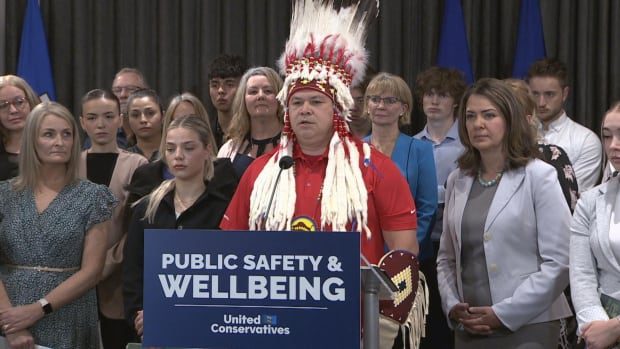Global Courant 2023-05-16 05:18:16
Alberta United Conservative leader Danielle Smith says she will introduce a bill to force treatment for people with severe drug addiction if her government wins the May 29 election.
Smith says the legislation would balance the rights of the public with the responsibility to help those in need.
“This is about saving lives and keeping our communities safe,” Smith said at a news conference in Calgary on Monday.
“(It) will enable us to save the lives of addicts who are at risk of dying of drug overdoses and protect those who are at risk of random attack in our communities. This is real compassion.”
Smith said her government has added 10,000 treatment rooms each year to provide detox and recovery services for up to 29,000 Albertans.
She said her government would also create more than 700 addiction treatment beds in 11 locations, including First Nations. There would also be five new 75-bed mental wellness centers.
Speaking in support of Smith and the proposed program during Monday’s announcement, Siksika Nation Chief Ouray Crowfoot pointed to the people on stage behind him and said the issue is not specific to one group of people or one ethnicity.
“This is not an Indigenous issue, it’s not a Siksika issue … this is a global pandemic in Alberta,” he said.
“People from Calgary, Red Deer, every city in Alberta are dying every day. We can’t stand idly by, as the Prime Minister said, and hope this passes. We have to deal with this head on.”
Smith said her administration has focused on recovery and treatment, while the NDP, which has approved controlled consumption sites as part of addiction care, would only make matters worse.
“The answer to addiction and public safety is no more drugs or ignorance or looking the other way and hoping for the best,” she said.
Smith’s UCP has also promised more police in Calgary and Edmonton to reduce violent crime, particularly in transit.
The proposed law would allow a family member, doctor, psychologist or police officer to request a non-criminal judge to issue a treatment order.
Danielle Smith and the UCP have also promised more police in Calgary and Edmonton to reduce violent crime. (The Canadian press)
Smith is a self-described libertarian who has sharply criticized the removal of personal freedoms, particularly vaccine passports, during the COVID-19 pandemic.
When asked about personal limitations, Smith said that in the case of addicts, they may not be able to make the best choices for themselves.
“We need to restore the ability for them to make decisions in their best interest to preserve their lives,” she said.
“I am confident that what we would do would be in full compliance with the Charter of Rights and Freedoms (under protection) for the life, liberty and security of the person.”
Lorian Hardcastle, an assistant professor at the University of Calgary who specializes in health law and policy, said the government would have to meet very high standards when depriving someone of their liberty, especially if the person is not charged with a crime.
Hardcastle said it would be up to the government to demonstrate that less drastic programs or initiatives have not worked or could not work.
“I don’t know what evidence they’re relying on to believe this would be effective,” Hardcastle said.
“Indeed, many public health experts are very concerned that these kinds of coercive policies are ineffective and would say instead that you should meet patients where they are and provide them with a wide range of treatment options, from damage control options to recovery.” -based options.”
The proposed legislation would be Canada’s first involuntary treatment bill specifically targeting addiction.
Alberta already has involuntary treatment laws for specific circumstances. Parents or legal guardians can petition the court to have youth placed for drug and alcohol disorders.
The mental health law allows for detention, but only in rare cases where the person is believed to be at risk of acute mental or physical distress or harm to others.
NDP leader Rachel Notley welcomed Smith’s proposal to invest in recovery, but went on to say the plan is flawed.
“In general, forced recovery is not successful,” Notley told reporters in Calgary.
“You have to have a whole person response and approach. You have to look at much broader forms of therapy and support on the front and much more transitional support on the other.”








